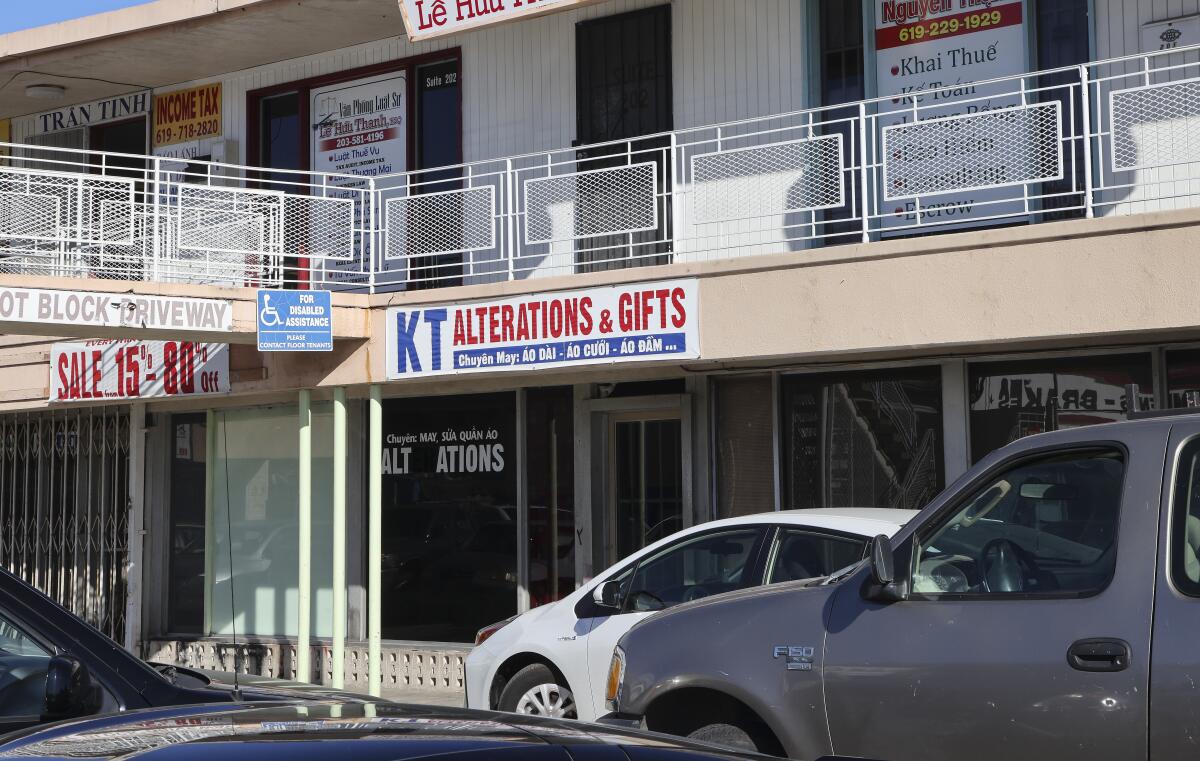Dozens charged in massive investigation into illicit San Diego gambling parlors
- Share via
SAN DIEGO — A massive investigation into dozens of illegal gambling parlors in San Diego ended with a series of morning raids Wednesday and charges against 47 people, according to a series of federal indictments.
The indictments, unsealed Wednesday, focus on alleged casino owners and several of their employees, who are accused of running the day-to-day operations, from providing security to managing the bankroll to paying out winnings. Several people also face charges of selling or distributing methamphetamine to patrons, as well as being felons in possession of guns. One woman was charged with importing half a pound of meth.
More than 450 law enforcement officers, led by the FBI’s Violent Crimes Task Force-Gang Group, fanned out across east San Diego neighborhoods for the sunrise takedown, searching 24 locations and arresting 35 people, according to the U.S. attorney’s office.
Fifteen of those arrested are part of the federal indictments, while 20 were taken into custody on state offenses. Three other people under indictment were already in custody.
An alleged murder and other crime have brought increased attention to covert gambling parlors
Over the course of the two-year probe, agents seized 44 guns, more than 12 pounds of methamphetamine, $263,000 in cash and 640 gambling machines, prosecutors said.
Footage from OnScene TV, a breaking-news video service, showed investigators removing dozens of machines from one home on Copeland Avenue in northern City Heights. The evidence filled the back of a large flatbed truck.
At least nine locations were allegedly run by Long Ngoc Tran, 41, also known as “Long Tu,” an associate of a Vietnamese gang who has previous convictions related to illegal gambling parlors and drugs. He reportedly told a cooperating source that he never went to his establishments and that counted on employees to run operations, keeping distance so they take the fall when law enforcement comes around, according to an FBI search warrant affidavit.
Gambling is a tightly regulated industry in California and is limited to licensed horse wagering, tribal casinos, state lotteries and cardrooms. It is generally illegal to run a for-profit casino or own a functioning slot machine that is less than 25 years old.
The bulk of these indictments were brought under the federal Illegal Gambling Business Act, which means the business must violate state gaming law, involve five or more people and have operated consistently for more than 30 days or gross more than $2,000 in a single day.
Wednesday’s searches, most of them in City Heights, cap a wide-ranging investigation meant to stamp out the rising violent crime and drug activity often associated with underground casinos.
From July 2018 to July 2020, more than 400 crime cases and more than 300 arrests were documented within a stone’s throw of 36 known gambling parlors, according to an affidavit. Homicides, shootings, stabbings, assaults, robberies, thefts, drug sales and gun possession have all been investigated.
Guns and meth are common parts of the landscape, according to investigators, as gang members are known to provide security and drugs are furnished — sometimes for free — to keep gamblers at their machines for long stretches of time, returning again and again for more.
“It’s rare to have a patron who does not use or sell methamphetamine inside these locations,” the U.S. attorney’s office said.
The search warrant affidavits and indictments provide a window into the inner workings of the casinos — located in strip malls, houses, outbuildings and apartments — which investigators routinely refer to as “gambling dens.”
The parlors typically have anywhere from four machines to more than 20, offering games of chance such as poker, blackjack, keno, tabletop “fish” games and slots. Some are open 24 hours, seven days a week, while others tend to operate overnight and close at dawn.
Each location is believed to pull in about $3,000 a day, although the machines are regularly audited and the cash removed to prevent robberies.
The investigation was largely built on a few cooperating sources who visited numerous parlors over the past year, witnessing gambling operations and drug activity. One cooperating person bought a sawed-off shotgun at a gambling site, according to an indictment.
Some casinos had been previously searched as part of the investigation, but agents learned that they were back up and operating in January, according to the affidavit.
One of those was on El Cajon Boulevard at a storefront known as KT Alterations & Gifts. It was shut down in October, and the FBI seized 16 video gaming machines, about $1,700 in cash that was concealed in drywall, as well as drugs and methamphetamine pipes.

An undercover employee and a cooperating source visited again on Jan. 19. A sign on the door indicated the business was closed, but a man let them in after they knocked, revealing an active gaming site, according to the affidavit.
“We have taken down the illegal gambling dens, and we have lifted a weight off our neighborhoods,” acting U.S. Atty. Randy Grossman said in a statement. “As a result of the collaboration of federal, state and local law enforcement officials, law-abiding citizens who live in these neighborhoods will be safer without these magnets for crime in their midst.”
Violent crimes at other illicit casinos have also drawn law enforcement attention over the past year, including a homicide at a Paradise Valley home and a shooting in Spring Valley, although they are not mentioned as part of this investigation.
Davis writes for the San Diego Union-Tribune.
More to Read
Sign up for Essential California
The most important California stories and recommendations in your inbox every morning.
You may occasionally receive promotional content from the Los Angeles Times.












